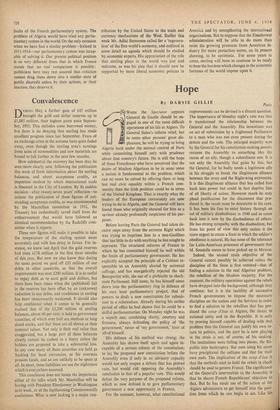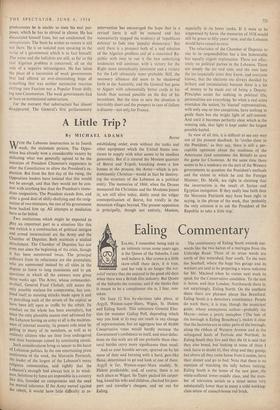Hope
By DARSIE GILLIE Paris
WHEN the Spectator appears General de Gaulle should be en- let gaged in one of the most difficult operations of his life in Algiers. To General Salan's infinite relief, but to some other persons' great dis- AS pleasure, he will be trying to bring Algeria back under the normal control of Paris while committing himself only with prudence about that country's future. He is still the hope of those Frenchmen who have perceived that the desire of Moslem Algerians to be in some sense a nation is fundamental to the problem, which can no more be solved by offering them at long last real civic equality within a French com- munity than the Irish problem could be in terms of the United Kingdom. That is exactly what the leaders of the European community are now trying to do in Algeria, and the General will have found those who originally shouted for him as a saviour already profoundly suspicious of his pur- poses.
Before leaving Paris the General had taken de- cisive steps away from the extreme Right which was trying to imprison him in a neo-Gaullism that has little to do with anything he has sought to represent. The structural reforms of France to which he has committed himself lie well within the limits of parliamentary government. He has explicitly accepted the principle of a Cabinet re- sponsible to an Assembly elected by universal suffrage, and has energetically rejected the old Bonapartist wile, the use of a plebiscite to check- mate Parliament. Still more, he has himself come down into the parliamentary ring in defence of his own least parliamentary project, that of powers to draft a new constitution for submis- sion to a referendum. Already during his earlier period of office he had shown that he could be a skilful parliamentarian. On Monday night he was a superb one, combining clarity, courtesy and firmness, always defending the policy of 'the government,' never of 'my government,' least of all of himself.
His defence of his method was strong; the Assembly has shown itself again and again in- capable of a serious reform of the constitution; to lay the proposed new constitution before the Assembly even if only in an advisory capacity would not only reopen a debate that has proved vain, but would risk opposing the Assembly's conclusion to that of a popular vote. This would defeat the very purpose of the proposed reform, which as now defined is to give parliamentary government a new opportunity in France.
For the moment, however, what constitutional improvements can be devised is a distant question. The importance of Monday night's vote was that it transformed the relationship between the General and the Assembly. His investiture was an act of submission by a frightened Parliament to a man who was not even present during the debate and the vote. The enlarged majority won by the General for his constitution-making powers restores the Assembly to something like the status of an ally, though a subordinate one. It is not only the Assembly that gains by this, but the General, for he badly needs a legitimate ally in his struggle to break the illegitimate alliance between the army and the Right-wing extremists. It is this illegitimate alliance that has called him back into power but could in fact deprive him of all liberty of action. However much he may plead justification for the discontent that pro- duced it, the result must be detestable in his eyes. It has been his fate to enter history through an act of military disobedience in 1940 and to come back into it now by the disobedience of others. He has strong sympathy with the disobedient, but from his point of view this only makes it the more urgent to create a State in which the soldier's obedience is natural. He has none of the tolerance for Latin-American processes of government that M. Soustelle seems to have picked up in Mexico.
Indeed, the second main objective of the General cannot possibly be achieved unless the discipline of the State is first restored—that of finding a solution to the real Algerian problem, the rebellion of the Moslem majority. For the moment, the military operations against the rebels have dropped into the background, although they continue; but it is the inability of successive French governments to impose the necessary discipline on the nation and the Services in order to find a solution to the rebellion that has pro- duced the coup d'etat at Algiers, the threat to national unity and to the Republic. It is only by proving himself capable of dealing with that problem that the General can justify his own re- turn to politics, and the part he is now playing in the crisis is not, of course, of his making. The institutions were falling into pieces; the Re- public into bankruptcy. But men using his name have precipitated the collapse and that for their own ends. The implication of the coup d'e'tat is that the methods used to hold the rebels in check should be used to govern France. The significance of the General's intervention in the Assembly is that he shares French Republicans' objection to that. But he has made use of the action of the Algiers adventurers to get himself into the posi- tion from which he can begin to act. Like his predecessors he is unable to state his real pur- poses, which he has to shroud in silence. He has dissociated himself from, but not condemned, the conspirators. The State he wishes to restore is still not there. He is an isolated man speaking in the name of a government which is in fact himself. The noise and the ballyhoo are still, as far as the real Algerian problem is concerned, all on the side of a negative intransigence. He has taken the place of a succession of weak governments that had offered an ever-diminishing hope of something that was neither nationalist reaction drifting into Fascism nor a Popular Front drift- ing into Communism. The weak governments had at least an institutional substructure.
For the moment that substructure has almost disappeared. The General's first parliamentary intervention has encouraged the hope that in a revised form it will be restored and has momentarily stopped the tendency of 'republican defence' to fade into 'popular democracy.' But until there is a prospect both of a real solution of the Algerian problem and of a renovated Re- public with men to run it the two underlying tendencies will continue, with a victory for the Right more immediately imminent and a victory for the Left ultimately more probable. Still, the necessary alliances did seem to be shadowed forth in the Assembly, and the General has gone to Algiers with substantially better cards in his hands than seemed possible on the day of his investiture. But the time to save the situation is inevitably short and the prospect in case of failure is disaster—not only for France.











































 Previous page
Previous page